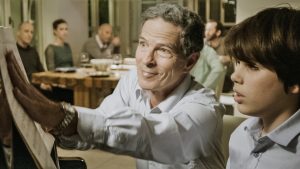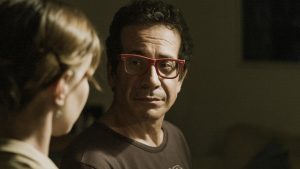‘God of the Piano’ tackles the perils of desperation
“God of the Piano” (2019 production, 2020 release). Cast: Naama Preis, Andi Lev, Ron Bitterman, Ze’ev Shimshoni, Alon Openhaim, Shimon Mimran, Leora Rivlin, Itay Zipor. Director: Itay Tal. Screenplay: Itay Tal. Web site. Trailer.
Preserving a family legacy is certainly a noble goal. It provides a sense of continuity that links the generations and gives a family its character, reputation and even notoriety. But how far is one willing to go to keep up the tradition? At what point does a goal turn into an obsession? And what are the costs of going too far? Those are among the issues raised and addressed in the captivating new Israeli psychological thriller, “God of the Piano.”
Anat Tal (Naama Preis) comes from a well-known musical family. Her father, Ariah (Ze’ev Shimshoni), has long been connected with the performance and composition program at a respected conservatory. Her brother, Dror (Alon Openhaim), is noted for his performance skills, even if he doesn’t pursue them as seriously as the family would like. And Anat is herself an accomplished pianist, even if her talents don’t quite rise to the standards of the rest of the family. She hopes to compensate for that, however, with the child she is carrying, firmly committed to seeing her soon-to-be-born son take over the family legacy and become an accomplished musician in his own right.

Pianist Anat Tal (Naama Preis) longs to continue the family legacy of virtuoso musicians but isn’t seen as quite having what it takes to do so in the new Israeli psychological thriller, “God of the Piano.” Photo courtesy of Film Movement.
When the infant arrives, though, Anat and her husband, Hanan (Ron Bitterman), are in for a rude awakening: the newborn is deaf. The disappointment is nearly crippling: how can a deaf child rise to the status of well-renowned musician? And, when Anat learns there is little hope for her son recovering from his condition, she becomes despondent.
Hanan steps in at this point and requests information from the Silent Speaking Institute, an organization designed to provide education to hearing-impaired children and to assist their families in coping with their particular challenges. But Anat quietly sees this as a wholly inadequate solution, because it doesn’t address the objective she has in mind – that of raising her own little virtuoso, a goal she clings to despite her circumstances. She becomes desperate and impulsively decides to take extreme measures to “correct” for this “accident” of birth. While in the hospital nursery one day, with no one looking, she switches the bracelets of her own child for one who obviously can hear. She tells no one, not even Hanan, and the new parents soon take home their “son.” And, when the child comes back to the hospital for subsequent hearing tests, he’s found to have miraculously recovered from his condition, the doctors chalking up his deafness to an inexplicable temporary impairment.
With no one the wiser, Anat begins raising her young son, Idan (Itay Ziper), to become the musical prodigy she hoped for. His grandfather is understandably proud, hoping for a bright future for the youngster, something that could become a reality with Anat’s committed guidance and Ariah’s recent promotion at the conservatory as an admissions committee member. And, as an older Idan (Andi Lev) approaches his teen years, hopes rise that he will fulfill his expected destiny.

When musician Anat Tal (Naama Preis) learns that her newborn son is deaf, her dreams of raising the next family virtuoso are shattered in director Itay Tal’s debut feature, “God of the Piano.” Photo courtesy of Film Movement.
However, despite Idan’s growth as a performer and composer, Anat grows increasingly compulsive about his training and commitment. As a 12-year-old, he’d like to be able to experience many of the same joys as his peers, something that Anat curtails in the belief that such distractions will derail his efforts. Likewise, as someone who is growing into adolescence, Idan wants to be able to start making his own decisions, including some that don’t jibe with his mother’s wishes. The obsessive stage mom attitude begins to run thin, not only with Idan, but also with Hanan, who disagrees with his wife’s strategies for not letting their son be who he is, a growing source of strife in their marriage.
Given Anat’s doubts about Idan’s commitment to his craft, she begins seeking the advice of a famous composer and performer, Rafael Ben-Ari (Shimon Mimran). In the process, considering Anat’s growing marital difficulties, their involvement soon turns personal, leading to an affair. But, while Rafael’s interests genuinely seem sincere, Anat sees their connection only in terms of what she can get out of it, namely, the means to help bolster her son’s chances for admission to the conservatory’s composition program. And that opportunity comes when Rafael lovingly composes a piece for Anat, something that she appears to graciously accept but that she secretly hopes she might be able to pass off as one of Idan’s works if the need arises.
While all this is going on, Anat also becomes uncomfortable that the secret of her hospital switch may be exposed. She’s reminded of what she did when she receives phone calls and mailings from the Silent Speaking Institute. While the communications are most likely attributable to her name never having been removed from the organization’s mailing list, the repeated contacts nevertheless serve as unnerving reminders of her actions. They occur so frequently, in fact, that, despite diligent efforts to cease these unsolicited communications, she finally visits the institute to demand that her name be removed from its contact lists. But that visit becomes even more unsettling when she meets an SSI administrator, Or (Leora Rivlin), who turns out to be Anat’s neighbor. And, when their conversation turns to one of the organization’s children, it strikes an uncomfortably familiar chord. Could it be that Anat’s past has come back to haunt her?

When budding musician Idan Tal (Andi Lev, right) begins his journey to greatness with the aid of his grandfather, Ariah (Ze’ev Shimshoni, left), he has little suspicion that he’s not who he thinks he is, as seen in “God of the Piano.” Photo courtesy of Film Movement.
By this point, it seems that Anat has gotten herself into a quandary much more deeply than she ever anticipated. With her son’s future, her current marriage and her own past on the line, she’s facing challenges at every turn. How will they turn out for her? That’s what remains to be seen.
Having goals is certainly admirable, but, when we become so preoccupied with their fulfillment, it’s easy for those objectives to turn into obsessions, as Anat’s actions so clearly demonstrate. And, as those desperate actions show, they can lead to all kinds of unintended consequences. Such fallout can be difficult to deal with, but that’s often the case when we lose our grip over the conscious creation process, the philosophy that maintains we draw upon the power of our thoughts, beliefs and intents in manifesting the reality we experience. If allowed to become obsessive, those driving forces in the creation of our existence can turn disastrous, leading to all sorts of new challenges, many of which could prove more demanding than any of those we envisioned at the outset.
Many of Anat’s actions illustrate the practice of un-conscious creation at work. This occurs when we become so focused on an outcome that we seek its fulfillment at any cost, no matter what other side effects may accompany it. This “consequences be damned” take on the process is usually driven by poor choices and an inherently reckless approach, leading to new problems to contend with, many of which are often handled in an equally irresponsible way, in turn prompting new generations of obstacles to overcome.

Distraught father Hanan Tal (Ron Bitterman) is upset that his overly controlling wife is raising their musical prodigy son in a way that deprives him of the joys of childhood in “God of the Piano,” now available for first-run online streaming. Photo courtesy of Film Movement.
Such results often come about from the practice of pushing the Universe, an attempt at manhandling the efforts of our divine collaborator in the conscious creation process. As those skilled in the practice understand, the philosophy works most effectively when we partner with the Universe (or God, Goddess, All That Is, Source or whatever other term best suits you), working jointly to produce sought-after outcomes. This involves making our intents known and then letting our collaborator take over. But, if we don’t allow this to happen, we may unduly interfere when we try to force the issue. It’s as if we doubt the ability of our partner to come through for us, leading to distorted manifestations of what we were initially seeking to achieve, leading to the aforementioned undesired side effects – and leaving us with new problems to be solved.
This is obvious, for example, through all of the challenges Anat faces when she switches the babies in the hospital. Had she not resorted to such a desperate step, she might not have had to deal with an adolescent with attitude issues, the frequent “pestering” of the Silent Speaking Institute or her marital troubles, among other problems. What’s more, all of this might have been avoided if she hadn’t been so single-mindedly focused on achieving her original goal. If Anat didn’t embrace the core limiting belief that a deaf individual was fundamentally incapable of becoming a musical genius, she may have encountered far fewer (and less daunting) problems. (I mean, hadn’t she ever heard of Beethoven? As a musician, one might think that she of all people would know better – and not cling to such a shortsighted perspective.)

When stage mother Anat Tal (Naama Preis, left) seeks the advice of renowned pianist and composer Rafael Ben-Ari (Shimon Mimran, right) about the future of her aspiring virtuoso son, their relationship turns more than professional in “God of the Piano.” Photo courtesy of Film Movement.
Anat faces an additional coping challenge through all of the reminders of her actions. For example, try as she might to eliminate the SSI communications, they keep coming back to haunt her, as if they were prodding her conscience to atone for her past. These synchronicities often provide us with clues about what we’re supposed to do. In most cases, they offer us beneficial tips that lead us to contacts or resources that can assist us. But, for Anat, they continually push her to make up for her mistakes, and their recurring nature won’t leave her alone until she does. That can be like living through a waking nightmare; do we really want that?
All of these issues can be avoided by acting authentically, being our true selves, and following our genuine, heartfelt dictates. Given Anat’s reactions to the challenges she eventually faced, she had to realize that her acts of desperation were not in her best interests or those of Idan and her family. Perhaps she had to undergo these experiences to learn that lesson, but, as the problems mounted, at some point she had to understand that what she had done was wrong and that the initial issue only became compounded by new ones as she tried to compensate for the original mistake. The sooner we realize we need to be truthful with ourselves, the better off we’ll be in the long run by creating a reality that best suits us.
Israeli director Itay Tal’s debut feature packs quite a suspenseful punch in its 80-minute runtime, especially in its remarkable ability to move the story along more by deeds than words. This psychological thriller staged in an unlikely setting makes it a fresh, original offering, one that captivates throughout. The film’s excellent ensemble and superb score (much of it original) bring this compelling story to life, keeping viewers on the edge of their seats right up to the end. This surprisingly gripping offering is available for first-run online streaming and is a featured presentation at upcoming events, such as the St. Louis International Film Festival.

When we allow our actions to be guided by our compulsions, we can set ourselves up for serious trouble. This illustrates the power of our convictions. If they take us into territory in which we know we needn’t dare set foot, the road ahead can be a difficult one. So, when such incidents arise, we’d be best to take a step back to consider where our beliefs may be leading us. It’s one of those times when second-guessing ourselves just might prove prudent, both in the short and long term. It could be difficult, but it could also save us considerable anguish, something that no obsession is worth.
Copyright © 2020, by Brent Marchant. All rights reserved.




Leave A Comment